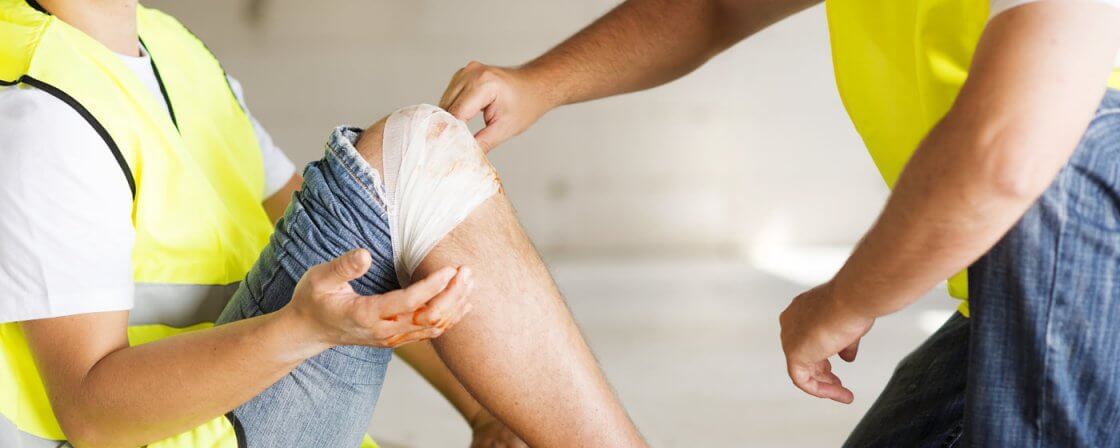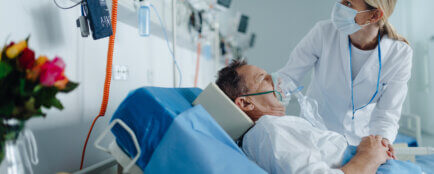What is an accident at work?
An accident at work is understood as an injury to the health of an employee or his/her death, which occurred as a result of or in connection with work tasks.
Are you solving a similar problem?
Solutions Tailored for You
Our team of experienced attorneys will help you solve any legal issue. Within 24 hours we’ll evaluate your situation and suggest a step-by-step solution, including all costs. The price for this proposal is only CZK 690, and this is refunded to you when you order service from us.
I Need help
- When you order, you know what you will get and how much it will cost.
- We handle everything online or in person at one of our 6 offices.
- We handle 8 out of 10 requests within 2 working days.
- We have specialists for every field of law.
Typically, we think of a workplace accident as an accident that occurs while doing some relatively dangerous work – for example, a gas leak in a laboratory and subsequent explosion that causes lacerations and damage to the eyesight of employees, or an electrical shock while installing electrical equipment.
However, an accident at work can also happen to any of us who are doing a perfectly safe job, for example in an office. For example, a sprained ankle caused by a fall in a stairwell on the way to the payroll department.
From the point of view of employment law, it is important to distinguish between the following work-related injuries:
- fatal – i.e. an injury from which the employee died within one year at the latest. It is therefore irrelevant to the legal consequences whether or not the death occurs directly at the workplace,
- serious – injuries involving hospitalisation for more than five days,
- accidents at work with hospitalisation of more than 3 days (relevant for reporting purposes),
- other occupational accidents.
The employer is obliged to keep a record of accidents at work and to enter each such case in the accident book.
Accident at work and sick leave
In the event of incapacity for work due to an accident, the employee is entitled to sickness benefits. Work accidents and sick pay are closely linked – the employer must provide compensation not only for loss of earnings but also for the costs of treatment. When it comes to long-term incapacity for work, it is important to get the documentation right, including the reporting of work-related injuries.
What should I do if I have an accident at work?
If you, as an employee, have an accident and your health allows you to do so, you must notify your employer immediately. The same applies if the accident happens to another colleague. However, the mere fact that you do not report the accident to your employer does not deprive you of any possible claim for compensation.
Mr Paul fell on a construction site, twisted his leg in a pit and fell on it. He took little notice of the pain and reported nothing to anyone. During the night, his leg swelled up and began to hurt more and a doctor diagnosed a torn knee ligament and issued him with a sick leave. Although Mr. Paul did not report anything, he can consider his injury to be work-related.
If an injury is reported, the employer will first investigate how it occurred and whether it is indeed a work-related injury. The mere fact that an injury occurred during working hours does not necessarily mean that it is a work-related injury. It is always examined whether work tasks were being performed and the connection between the performance of work tasks and the accident. Employees are required to cooperate in the investigation of the circumstances of such an accident.
In a now legendary example of an accident at work, a construction worker claimed compensation for an accident that occurred during his break when he went to light a cigarette and sat on an unprotected skylight near the roof. From the employer’s point of view, the work was not in the course of work and the employee had been sufficiently warned not to sit on the spot (the court accepted that the vulgar instruction “Shit, don’t climb on that skylight, you might fall off” was sufficient). Nevertheless, in the end, the courts held that when an employee stops work for a while, even though the employer has not declared a break in work, to smoke a cigarette during working hours, this is a normal act of the employee which cannot relieve the employer from liability for any accident that happens to the employee at that moment. The accident was therefore recognised as an industrial injury and the only subsequent consideration was the degree of contributory fault of the employee who failed to heed his employer’s warning.
Situations where, for example, an employee collapses or has an epileptic seizure at work and as a result injures his or her head are controversial. The employer must investigate what exactly led to the collapse or seizure. If the cause was any increased exertion, which may have included stress, i.e. mental exertion, then the subsequent injury is a work-related injury. This fact has been repeatedly confirmed by the Czech courts.
If it is confirmed that the accident was work-related, the employer must enter it in the accident book and, if it was an accident with incapacity for work for more than 3 days, he must draw up a record and send it to the relevant authorities and institutions and also forward it to the employee.
Work accidents and employer reporting are crucial not only for the payment of compensation but also for the determination of pain and suffering benefits.
For example, if a serious work injury occurs, such as a ligament tear or fracture, the employer prepares a record and follows the applicable legislation. Pain pay for a work-related injury is calculated on the basis of a medical assessment score.
Tip for article
Tip: If the employer is concerned that there has been a loss or change in the employee’s ability to work, for example if the employee has not worked for more than 8 weeks after an accident at work with severe consequences, the employer can order an emergency medical examination. We have covered this topic in more detail on our blog.
Painful – what does it mean and how is it determined?
Pain damages are compensation for the harm caused by the injury to your health. It is determined according to a points system, and the value of a pain point can vary.
Pain is determined by a medical opinion based on current pain assessment methodologies. These methodologies contain a detailed list of injuries and their scores. The number of points corresponds to the severity and extent of the injury. For example, if a work accident causes a severe spinal injury, it will have a higher score than a minor contusion. The exact calculation of the pain award is based on a medical opinion, with each point having a predetermined monetary value.
What about injuries sustained on my lunch break, on business or on the way to the doctor?
We see occasional queries where the injury occurred de facto during or shortly before or after working hours, but the employee was away from the workplace at the time. In this case, we need to distinguish which moment it was.
- If you are only on your way to the workplace, or have already left it after working hours, this is not in the performance of your duties and any injury is not work-related.
- If you leave for lunch or a doctor’s appointment, the same applies as in the previous point.
- If you go to a business meeting or go on a business trip, the situation is different because it is in the performance of your duties. If you have an accident at a meeting or on the way to a meeting, it is considered work-related.
- On the other hand, if you are celebrating the birth of a colleague’s child in the office after work and you knock over a desk and break your arm, it is not a work-related accident, even though it happened in the workplace.
Local time and material considerations are always taken into account to assess whether it was directly related to the performance of work tasks.
What am I entitled to if I have an accident at work?
Consider first the situation where you have had an accident at work that was not your fault – that is, you were not under the influence of alcohol, you did not break a set procedure or a regulation.
In this case, your employer is obliged to compensate you for:
- damages in kind,
- reasonable costs of treatment,
- loss of earnings,
- pain and suffering, and inconvenience to your social life.
Material damage – this is compensation in money for damage to property. If, for example, the employer’s own car (used with the employer’s consent), the employer’s clothes, etc. have been destroyed. In some circumstances, this may include other costs, for example, to arrange for people to look after your household if the accident has made this impossible.
Purposefully incurred medical expenses – this includes costs for medication, rehabilitation, nursing, doctor’s fees etc. The exceptions are costs paid by the insurance company and costs that are not reasonably incurred.
Loss of earnings – This means, firstly, the reduction in earnings during the sick leave following the work injury. The purpose of this compensation is to compensate the employee for loss of earningsduring the period of incapacity.
Should the work injury result in a permanent inability to earn the original earnings, the employer must also compensate for such loss. The employee would then be entitled to the difference between his average monthly gross earnings before the injury (determined by the employer) and the earnings he achieved after the accident or the occupational disease, plus any disability pension
Pain and impairment of social work – this is a one-off compensation for the damage caused by the injury to health, paid on the basis of a medical opinion. It is usually determined at the time when the medical condition is stable. In theory, however, it can be paid repeatedly if further pain is incurred.
In the case of pain and suffering, compensation is determined on the basis of a table where a certain number of points are assigned to each type of injury. In the case of a work-related injury, the pain and suffering award is determined by a medical opinion based on currently applicable methodologies (for example, the Supreme Court Methodology or the insurers’ internal methodologies). The value of one point is not fixed by law but is governed by these methodologies. This makes the system flexible and better reflects the severity of the actual injury.
Exemption from employers’ liability for accidents at work
The employer is fully exonerated from liability if it proves that the damage occurred:
- the injured employee’sbreach of regulations or instructions on health and safety at work, and the injured employee was duly informed of them,
- as a direct result of drunkenness or under the influence of other addictive substances used by the employee.
However, the burden of proof in this case lies with the employer.
Accidents at work and the employer’s obligations
The employer has a duty not only to provide a safe working environment, but also to deal with the consequences of accidents at work. Its duties include:
- Recording accidents at work.
- Ensuring that workers are compensated, including payment of pain and suffering benefits.
- Reporting accidents to the relevant authorities.
Long-term or permanent consequences of an accident at work
If, as a result of an accident at work, the employee can no longer perform his or her work according to the medical report, the employer must transfer the employee to another job. If this is not possible, this is one of the exceptional cases in which your employer may give you notice. However, in this case you are entitled to severance pay of at least 12 times your average earnings.
Summary
An accident at work is an injury to an employee’s health or death as a result of or in connection with the performance of work tasks. The employer is obliged to report the accident and keep a record of accidents at work, including the creation of a record for more serious cases. Employees are entitled to compensation for material damage, loss of earnings, medical expenses and pain and suffering, which is determined on a points-based system. An accident at work may also occur in the course of normal activities if it is related to work tasks. It is also decided whether the accident was partly the fault of the employee. Specific rules apply to injuries during a business trip or a work meeting, while injuries outside work tasks (e.g. lunch) are not considered work-related.
Frequently Asked Questions
What is an accident at work and how do I know it under the Labour Code?
According to the Labour Code, an accident at work is an injury to the health or death of an employee that occurs during the performance of work tasks or in direct connection with them. This includes situations where an employee slips on a staircase, is injured while handling work equipment, or suffers an accident while on a business trip. Conversely, not every fall or accident in the workplace is automatically an accident at work – local, temporal and material connection is assessed.
What is the time limit for reporting an accident at work and can it be reported retrospectively?
The employee is obliged to report the accident immediately – as soon as his/her health allows. If a worker is injured and does not report the injury until later, it may still be a work-related injury, even if the injury was reported retroactively.
The employer must register the injury, complete an injury form, make a record and, for injuries with more than 3 days’ incapacity for work, ensure that the injury is officially reported.
What is the procedure for an accident at work and how is reporting handled?
The procedure for an accident at work includes:
-
immediate reporting to the employer,
-
medical treatment and the issue of a report,
-
investigation of the circumstances of the accident by the employer,
-
entry in the accident book,
-
in the case of more serious accidents, making a record and reporting to the authorities.
The worker is also entitled to compensation for wages, sickness benefits (called occupational accident and sick leave) and other compensation under the Labour Code.
How is work injury compensation calculated and how long does it take to be paid?
The calculation of compensation for work-related injuries includes the following items: wage compensation during incapacity for work, loss of earnings after the end of the incapacity for work, medical expenses, damages in kind, pain and suffering from the work injury, and impairment of social life.
The amount of compensation may vary depending on the methodology used – insurance companies’ methodologies or the Supreme Court’s methodology are common, regardless of whether the compensation is for a 2018, 2019 or 2025 work injury.
And how long does it take to pay a work injury claim? Usually a few weeks to months, depending on the complexity of the case, the speed of the medical reports and the cooperation of the insurance company (e.g. work injury compensation Kooperativa).
How does an accident at work work work for agreements (FTE/STP) and what is the compensation?
Even a work performance agreement (WPA) or a temporary employment contract (FTE) gives rise to a right to compensation for an accident at work. The employer is obliged to report the injury, investigate it and provide the employee with all the same compensation as in an employment relationship – including pain and suffering, medical expenses and any loss of earnings.
The only exception to this is sick pay, which is not paid under the PPA, but the employee is entitled to sick pay if he or she has met the conditions for participation in sick pay.
What if the work injury has permanent consequences or results in death?
If the injury causes permanent consequences, the doctor will determine a score and the employee is entitled to compensation for permanent consequences, increased social impairment and long-term compensation for loss of earnings.
In the most serious cases, there is a claim for compensation for a fatal work injury, funeral expenses and compensation for survivors.




